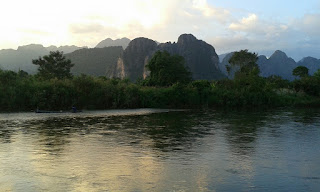Killing Fields Cambodia
No
one said anything for a long time. We sat in the tuk-tuk rumbling over the
dirt-roads of Cambodia, losing our gaze in the rice-fields or staring straight
ahead. Then slowly a discussion unraveled, we could not keep our questions to ourselves:
Has humanity improved since? Has there been any positive change in the world?
To use stereotypes: Did we learn from our mistakes? These were the questions
sparking the debate between backpackers of different nationalities and
age-groups driving back to Phnom Penh City. We had just visited the genocide
memorial center Choeung Ek, also known as the Killing Fields.
It is simply unbelievable what happened in this country between 1975 and 1979. Two to three million people died or were killed out of a population of then eight million Cambodians. Why? A radical communist, Pol Pot and his improvised army of young Cambodian countrymen, the Khmer Rouge, decided to transform Cambodia into a Marxist society: purely agrarian and self-sufficient. This meant that all people living in cities, all intellectuals, doctors, anyone speaking a foreign language or having been in contact with foreign institutions became an enemy. Hundreds of thousands of people were evacuated from cities and forced to work in the fields. Families were torn apart to establish a commune-society. Millions died of starvation and treatable diseases, because the rice they harvested was sold to China in exchange for weapons. Tens of thousands were systematically tortured, killed and buried in mass graves like the one I had visited.
How could this have taken place in 1975 – the year my dad was 31, worked for BMW, and the Rocky Horror Picture Show was released in the USA? Can this happen again? Or – worse – is this happening again? What has been going on in Syria for the last five years? With over 200,000 killed, seven million internally displaced and two million refugees, out of a population of 17 million, the situation seems similar. But there is no systematic killing going on – we recon. There is no ethnic cleansing, and they don’t smash babies' heads against trees to kill them – at least that’s what we hope. Has humanity improved? There is Yemen as well. And Libya, Nigeria, Sudan and Mali. I don’t know these countries. I might only visit them 40 years after their respective wars, I might visit memorial centers of genocides, wondering, how this was possible back in 2016, when I was 31, working for the Swiss Embassy and Die Hard 6 was released in Europe.
I still try to think that things have changed for the better. Since World War I, war is no legal option of politics anymore – at least judicially. We have the UN, which – I admit – is highly dysfunctional, but it exists. There are less despotic rulers worldwide who would be able to orchestrate a genocide this cruel and of this measure, only comparable to the Holocaust. And even if you do not agree with this hypothesis: We have many more means to address humanitarian crises around the world through the UN-bodies, NGOs and the help of internet and mass media. We can raise attention in real-time, thus limiting the possibilities of action by the offenders. Our world order might not have changed the nature of mankind (although it would be worth having a deeper look at that hypothesis), but it has certainly improved on the control-mechanisms to avoid disasters. International law, although still struggling to be enforced, does curb the impunity of offenders worldwide.
Knowing the cruelty of human beings, you also witness the love and compassion humanity is capable of every day. It just does not have the same market-value for the media. There are people all over the world dedicated to solutions. It is hard and meticulous work, often stepping one step back after two have been stepped forward. But their work matters. Every person’s contribution matters and is even a necessary effort in the face of humanitarian atrocities. Embedding countries and their elites into international treaty-systems that will not allow them to act with impunity against their own or other countries` citizens is crucial. Enforcing the power of international organizations overseeing these treaties to monitor and act upon breaches of standards is a next step. As a third point: allowing countries to develop in their own pace and in their own way is necessary. Their economies, values and societies seem to be trying to copy the “western” examples, instead of finding ways of development that suit their own circumstances. Countries and cultures should be asked to pronounce in their own words the set of universal values we have codified in our “western” language. This new understanding of international relations could be the next level of diplomacy, a respectful face-to-face dialogue without presuming the moral superiority of the “western way”.
I
will try to find a work that goes in exactly this direction. Where I can educate,
communicate, mediate. That will be my goal for 2016.




Comments